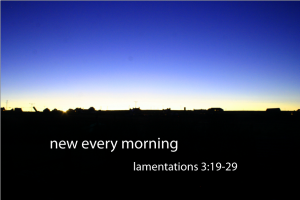Jeremiah 31.31-34: Explorations on New and REnewED in the Bible
Author: Bobby Valentine | Filed under: Bible, Exegesis, Hebrew Bible, Hebrews, Jeremiah, Paul, Romans“It is always more or less detrimental to the ascertainment of truth to allow our previous conclusions to assume the position of fixed and fundamental truth to which nothing is to be at any time added either in correction or enlargement. On the contrary, we ought rather to act under the conviction that we may be wiser today than yesterday” (Alexander Campbell, 1840)
Never Stop Exploring … Courage to Look in the Telescope or Under the Rock
Sabbath Day Theology (today is Saturday!) celebrates God’s work and words of grace. God’s mercy, love, grace are new every morning and we celebrate that on this new day and every new day. So I am thinking about things that are “new” today … but first a very brief word.
When people say “The Bible plainly says” or “The Bible clearly declares” or “The Bible says what it means and means what it says” “The Gospel is not difficult to understand and you don’t need a PhD to understand it” … there is usually a self-serving agenda going on.
First, the Bible never has been, and never will be, “the Gospel.” The Gospel is the message of what God has done in, and thru, Jesus of Nazareth the Messiah. Second, the Bible contains far more than simply “the gospel.” All the Bible is necessary for our Spiritual growth but not all the Bible is the Gospel. Third, something could have been as “plain as day” and “clear as the noonday sun” in AD 55 in Greek and Latin speaking Philippi or 800 BC that is as strange, and opaque, as can be in AD 2016.
The people using such lingo just cited only use such language when a cherished shibboleth has been called into question by historical study, the purpose of which is to get us to hear the word just like it was stated in AD 55!! These same folk do not hesitate to get exceedingly complex when explaining why psallo does not mean sing and play. Our current exploration will be quite simple by comparison.
Something, however, may not be so obvious yet as true as can be. For example the meaning of “new” does not necessarily mean totally NEW, or categorically different, as that word seems to conjure up for some disciples in our culture but did not in previous ones. In fact “new” does not necessarily mean brand new even in common ordinary English. My nephew was all excited recently and sent me some pix of his new blue car. Well the car was not brand new and no one ever dreamed of saying to him he was not speaking clearly. The car is in fact several years old with thousands of miles on it … but it was still very new.
Being good readers usually comes with asking good questions. To grow in the grace and knowledge of the Lord requires asking questions of ourselves and our assumptions … What does the Bible mean when it uses the word “new” … and that is in English we understand for the world “new” does not actually occur in the Bible itself. We will learn the word/s that actually are used in a moment.
Sabbath Day Thoughts on Exploring New and Renewed
New is not necessarily “new” in the Bible any more than it is in English. This astounding (and crucial) fact is so frequently hidden from our view. In Greek the word “kainos” translated as “new” does not mean “totally” new or new in “kind” but most of the time has meaning of “reNEW.” ‘neos” is the Greek word of something totally new and different. In Hebrew the word “hadas” can be mean either “new” or “REnew” and only the context lets the reader know which is which. The “new” is the old “renewed.” American consumers are very familiar with old products that are
“renewed” and packaged as “new.”
New Moons and Renewed Moons
To illustrate. A few nights ago here in the desert, and I assume all over the world, we had a new moon in the sky. Unless NASA is hiding some important scientific truth, no new celestial body is orbiting the Earth. It is the same moon but it is REnewed in its orbital cycle. The Hebrew Bible does not teach that God creates a brand new and different moon each “new” moon. In fact the “new” moon is a sign in the heavens to the faithfulness and continuity of God’s creation.
I bought some “new” Tide detergent the other day. It is not “different.” The “new” is the “old” Tide renewed. Thus in the Bible we read about “new” moon festivals in Israel. No Israelite believed there was a DIFFERENT moon in the sky. The “new” moon was a REnewAL of the OLD but very SAME moon.
“Tomorrow is the new moon …” (1 Sam 20.5)
“Jonathan said to him, ‘Tomorrow is the new moon, you will be missed” (1 Sam 20.18)
“When the new moon came the king sat the feast to eat” (1 Sam 20.24)
“the day after the new moon” (1 Sam 20.27)
In each case the old Moon has been made hadas. It has been “made new” or renewed. But it is the same moon.
To Make New/Renew or Rebuild the Temple or Cities
By the time of Asa the Jerusalem temple had fallen into a state of disrepair frequently following the people’s lack of faithfulness to the Lord. But they had gathered/assembled in Jerusalem at the time of the Feast of Weeks/Shavuot (Pentecost) as the Chronicler tells us. Pentecost was traditionally seen as a time of renewal by Israel and the gathered people join the king in making a new altar? Making the altar new? Or repairing the altar? Clearly it is the same altar that is being … hadas or renewed rather than a totally different altar.
“He [Asa] repaired/rebuilt/made new/renewed the altar of the Lord that was in front of the vestibule of the Lord” (2 Chronicles 15.5)
Joash likewise made new, restored, renewed not the altar but the temple itself as the Chronicler says,
“Some time afterward Joash decided to renew/restore the house of the Lord” (2 Chronicles 24.4)
“they hired masons and carpenters to restore the house of the Lord” (2 Chronicles 24.12)
They are not building a “new” temple but renewing the same temple that Solomon built centuries before.
The Lord promises through Isaiah that the desolation of the cities of Israel would be hadas …
“They shall build up the ancient ruins,
they shall raise up the former devastations;
they shall repair/renew/make new the ruined cities,
the devastations of many generations. (Isaiah 61.4)
The cities that are being “made new” or “renewed” are the same cities that were broken down. They are not different cities.
In a significant text reflecting, again, the devastation of Babylonian invasion and the exile of God’s people a plea for hadas …
“Restore to yourself, O LORD, that we may be restored;
Renew/make new our days as of old …” (Lamentations 5.21)
Making New/Renewing Energy and Mercy
In the Bible we read about Yahweh’s Hesed (unending gracious love) being NEW every morning.
“The steadfast love of the LORD never ceases,
his mercies never come to an end;
they are new/renewed/made new every morning;
great is your faithfulness” (Lam. 3.22-23)
Many verses testify to this same reality and we are grateful for them. But no Israelite, or biblically literate person, imagined that Yahweh’s Hesed is DIFFERENT every morning. Rather God’s endless Hesed is reNEWed for his creation. The “new” Hesed of God is but a fresh outpouring of the same wondrous grace of God. In the LXX the word is “kainos” in this text and not “neos.”
“ … but those who wait for the LORD shall renew their strength,
they shall mount up with wings like eagles,
they shall run and not be weary,
they shall walk and not faint” (Isaiah 40.31)
A New or Renewed Command
The Bible records Yeshua saying “a NEW commandment I give you” (Jn 13.34). There is not a single Jew that imagined Jesus was giving them a BRAND NEW/DIFFERENT commandment. The Greek word is “kainos” which means to restore or renew. Every Jew knew that the Torah commands that we love our neighbor and even our enemy (See my linked blog “Knowing the Heart of the Stranger: The Old Testament and Loving Our Neighbor“). As John put it in his little Epistle, “Brothers and Sisters, no new (kainos) commandment I give you but an old” (1 Jn 2.7; cf 2 Jn 1.5). Jesus is renewing the meaning of the original word of God in the Torah and is showing what it means in his own life, death, and resurrection. The “new” command to love is but the “old” seen afresh in the life of God’s own Messiah.
A New Heavens or a Renewed Earth
The Bible speaks of the coming day of the Lord in which the world will be engulfed in an ocean of fire just as it was once engulfed in an ocean of water in Noah’s day. Out of the ocean of water emerged a new world and out of the ocean of fire there will emerge a NEW heavens and NEW earth (kainos). It is not a DIFFERENT world but a reNEWed creation purified as God intended all along. The “new” world is but God’s gracious care and love for the SAME world.
A New or Renewed Covenant
There is only one place in the Hebrew Bible where the words “new covenant” occur and that is Jeremiah 31.31ff. “The days are surely coming, says the LORD, when I will make a renew/make new/restore covenant with the house of Israel and the house of Judah …” The Hebrew text uses our word hadas. This text is quoted in the New Testament in the book of Hebrews. And unknown, I do not know why, to many ministers this text is quoted by Paul in Romans 11.27 (I will return to Romans). I would encourage you to explore Jeremiah 30-32 which is called the “Book of Consolation.” Often “new” testament “Christians” do not do this simple exercise of exploring Jeremiah.
I have done a lot of flying in my life. Some one once asked me if I had ever been to Colorado before and I said “I have landed in the Denver airport repeatedly!” Landing. Touching down. Disembarking. Walking around the airport does not mean I know a thing about Denver, much less Colorado. So many students do the same with the Bible. A verse is their airport! They see it, they seize upon it, and think they have been biblical when in fact they have no more understanding of what surrounds that verse than I do whats beyond the walls of the airport. Jeremiah 31.31-34 has a context in the Book of Consolation and within Jeremiah as a whole. Our assumptions need to be examined especially when those assumptions have never been filtered through Jeremiah. What does hadas mean to Jeremiah? The translators of the LXX thought it meant kainos. Of interest in reading the Book of Consolation such passages as 32.36-41 and 33.14-26 which are virtually parallel passages within the Book of Consolation and certainly belong to any contextual understanding of Jeremiah 31 just a few verses away.
When the Hebrew Preacher quotes this text about the “NEW” covenant he uses the word … “kainos.” When we read Jeremiah, and Hebrews btw, it makes several facts crystal clear:
1) the kainos covenant is between the same people as the “old” covenant – like it was the same altar, same temple, same moon, same love command, same cities;
2) the kainos covenant is with those who failed in faithfully living the old covenant;
3) that the kainos covenant has the same Torah of God as the old;
4) that the kainos covenant makes the exact same marriage vow/promises as at Sinai that “I will be your God and you will be my people” which is the same vow as the old covenant made at Sinai. “I will put my dwelling in your midst … And I will walk among you, and will be your God, and you shall be my people” (Leviticus 26.11-12).
It is of great significance that Hebrews primarily uses the word kainos for this “new/renewed” covenant. Perhaps our understanding of what the “new” covenant needs to be reflect that truth that God is actually REnewING his covenant with his people. It is new like the new moon, like the new mercies every morning, like the new commandment … Sometimes our understanding of new needs to be renewed.
As noted above many students ignore the fact that Paul also quotes Jeremiah 31. What is so interesting about Romans 11 is the text is directed explicitly towards arrogant Gentile believers who seem to make much of what they interpret as Jewish unbelief. They “claim to be wiser than [they] are” according to Paul (11.25). Paul quotes two texts to put the Gentiles in their place, the second being from the conclusion of Jeremiah’s prophecy of the renewed/made new covenant (31.34).
“And this is my covenant with THEM, when I take away their sins” (Romans 11.27 quoting Jeremiah 31.34)
Paul’s use of this text is completely different than the Hebrew Preacher’s. Paul applies the text 1) to Jews and 2) he applies it eschatologically to what God will do and not what God has already done! This is most interesting and needs some serious reflection and exploring.
Exploring and the Wonder of God’s Word
Exploring is a life long adventure. When Galileo turned a very primitive “telescope” toward the heavens he did not invent anything new. He saw what had always been there but people had been unable to see. Every new discovery is not an invention but rather a moment of grace when God allows us to see. Theologically every moment of seeing is a moment of restoration, it is the removal of prejudice, the clearing up of misunderstanding, it is to comprehend just a fraction of the infinite wisdom of God. Sometimes we learn something as simple that “new” almost never means brand new and different than before but is in continuity with what went before.
It is my prayer that this simple exercise in exploration will help us hear the Hebrew Bible better. It is my prayer we will see the “New” Testament better. The coming of Jesus did in fact usher in something “new” but it is not brand new and different. When a man marries a woman he enters a new relationship with her but it is not against the old one. Rather it takes the old one and makes it deeper, richer and fuller. But there is no repudiation of the woman and all her “charms” from previously.
Sources for thinking about “New” and REnewED
Walter Kaiser, “Old Promise and the New Covenant: Jeremiah 31:31-34,” JETS 15.1 (1972): 11-23
Fredrick C. Holmgren, The Old Testament & The Significance of Jesus (especially chapters 5 & 6)
Pieter A. Verhoef, “hadas” in New International Dictionary of Old Testament Theology & Exegesis, ed Willem A. VanGemeren, vol 2, pp.30-37.
John Goldingay, Do We Need the New Testament: Letting the Old Testament Speak for Itself
Richard Hays, Echoes of Scripture in the Letters of Paul
Richard Bauckham, et all, The Epistle to the Hebrews and Christian Theology
Hans Walter Wolff, “What is the New Covenant?” in Confrontations with the Prophets, pp. 49-62
I do not agree with all of these in every detail. However they are all excellent sources by recognized scholars of all persuasions and above all else they deal with the text.
Tags: New Covenant




February 27th, 2016 at 8:27 pm
The first time I caught on to this idea was in studying Revelation 21:5. Metzger first opened my eyes to this and then I think it was Witherington in his commentary.
As people of the Restoration movement, we should be in tune with things like this. God is restoring far more than a pattern of worship. God is restoring all things! That is truly Gospel!
February 27th, 2016 at 8:51 pm
“God is restoring all things!” Amen, Matt. It is Good News. The Good News 🙂
February 27th, 2016 at 8:44 pm
Always seeking to understand. I especially like this blog post because it comes during an “eternity-mindedness” my faith journey places me now; which includes being deeply focused on a renewed heaven and earth. Thanks for your words today. They resonate, in divine timing.
February 27th, 2016 at 8:50 pm
Delighted to have you take the time and reply Carmel. I am honored you came by. I agree with you in focusing on that renewed heaven and earth. Always helps me look beyond the present, in fact to see my present from the renewed heaven and earth. Changes everything.
February 28th, 2016 at 7:54 am
Well, here we are again. I hope you don’t if I pull up to the round table.
Your point is very well made, taken, understood and agreed upon concerning how some people approach the scriptures.
This is equally true of your metaphor of a verse as being the airport: a small piece of land on which they, like travelers passing through land without ever exploring the city near that airport.
What is true of verses in isolation, Bobby, is also true of word study and definitions in isolation. There is absolutely no argument against the definitions which you have provided from the Hebrew and Greek for the English word “new.” Whether one’s preferred English word is “new” or “renew” does nothing to understand the much broader significance and meaning of the theology of Jesus as the sacrificial lamb.
The truth is that, as you well understand, a first century as well as twenty first century Jew understands quite well the meaning of the word without any explanation. It is the broader application of new/renew by Jesus as the sacrificial lamb of God becomes a choking threshold and a gagging point for Jesus. It was not in the first century and it is not in the twenty first century a simple matter of renewal of the same old covenant.
February 29th, 2016 at 8:15 am
“Doctrine” is built on what the text actually teaches brother Gil. I have not, however, simply given a few isolated verses. How we understand these terms is very important. Sadly most western Christianity still follows the ghost of Marcion from the second century rather than what the real issues were in the first.
The “new” covenant is the Old Covenant “renewed.” Jesus is the fulfillment of all those very promises and they are true in him. Technically, according to the NT, Jesus himself is the covenant. In him God’s promises are “yes.” Luke and Paul are on same page in the NT but that page is not what traditional Protestantism has vainly imagined.
February 29th, 2016 at 8:11 am
In some sense there is nothing “new”, after all Solomon argued that “there is nothing new under the son’ at least at its core value. Long before there were computer there were people who could calculate and crunch numbers and correlate information.
But even within the understanding of “renewing” is the thought that usually the “old” is left behind in favor of the “new”, which is usually better. Even in the Tide example the “new” Tide was to replace the “old” Tide.
We as Christians are to “renew our minds daily”, which implies putting away the old thoughts in favor of the new and better thoughts.
So moving to the covenant, even the “renewed” covenant is to replace the other covenant in terms of relevance and power. This doesn’t make the old covenant sinful, but rather inferior to the new. Accordingly the old covenant or law was to be a tutor to bring us to Christ and the perfect Law of Liberty.
March 3rd, 2016 at 6:06 pm
This passage has the same message Jesus was telling the woman at the well in John 4.